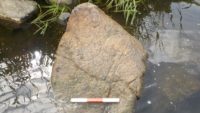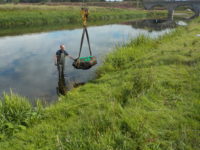 A rare stone carved with Pictish symbols has been discovered in the River Don in Dyce, Aberdeen, thanks to an extended period of unseasonable heat and a keen-eyed local fisherman. The hot, dry weather this summer dropped the water level of the Don to the lowest it has been in decades, exposing the stone on the bank of the river. A fisherman spotted it and reported the find to Aberdeen University. Archaeologists examined the stone and identified it as a Class I Pictish symbol stone, an unworked stone dating to 6th to 8th century A.D. with multiple symbols carved into the surface, among them a triple disc with cross bar, a mirror, and a notched rectangle with two internal spirals.
A rare stone carved with Pictish symbols has been discovered in the River Don in Dyce, Aberdeen, thanks to an extended period of unseasonable heat and a keen-eyed local fisherman. The hot, dry weather this summer dropped the water level of the Don to the lowest it has been in decades, exposing the stone on the bank of the river. A fisherman spotted it and reported the find to Aberdeen University. Archaeologists examined the stone and identified it as a Class I Pictish symbol stone, an unworked stone dating to 6th to 8th century A.D. with multiple symbols carved into the surface, among them a triple disc with cross bar, a mirror, and a notched rectangle with two internal spirals.
Gordon Noble, Head of Archaeology at the University of Aberdeen, is currently leading a major research project into the early medieval Kingdoms of northern Scotland and Ireland. He said:
“Although there is a corpus of more than 200 of these stones across Scotland, each one is unique and this is a fantastic example which enables us to fill some of the gaps in the record and helps us to trace the development of literacy in north-east Scotland. As such, it is a very significant find.”
 With the water levels expected to rise again soon, the clock was ticking on recovering the stone for further study, conservation and display. Experts from Historic Environment Scotland (HES), the Aberdeenshire Council and University of Aberdeen worked with contractors AOC Archaeology and a specialist lifting firm to raise the heavy stone out of the river. The logistical challenge was significant because the weight of the symbol stone required a crane to lift it safely, but the crane would have to be perched on the riverbank which is less than ideal a platform for heavy machinery. A mobile crane did the trick, however, and the ancient stone was successfully pulled form the Don without suffering any damage.
With the water levels expected to rise again soon, the clock was ticking on recovering the stone for further study, conservation and display. Experts from Historic Environment Scotland (HES), the Aberdeenshire Council and University of Aberdeen worked with contractors AOC Archaeology and a specialist lifting firm to raise the heavy stone out of the river. The logistical challenge was significant because the weight of the symbol stone required a crane to lift it safely, but the crane would have to be perched on the riverbank which is less than ideal a platform for heavy machinery. A mobile crane did the trick, however, and the ancient stone was successfully pulled form the Don without suffering any damage.
The stone has been transported to Edinburgh for the time being. Its final disposition has yet ot be determined.